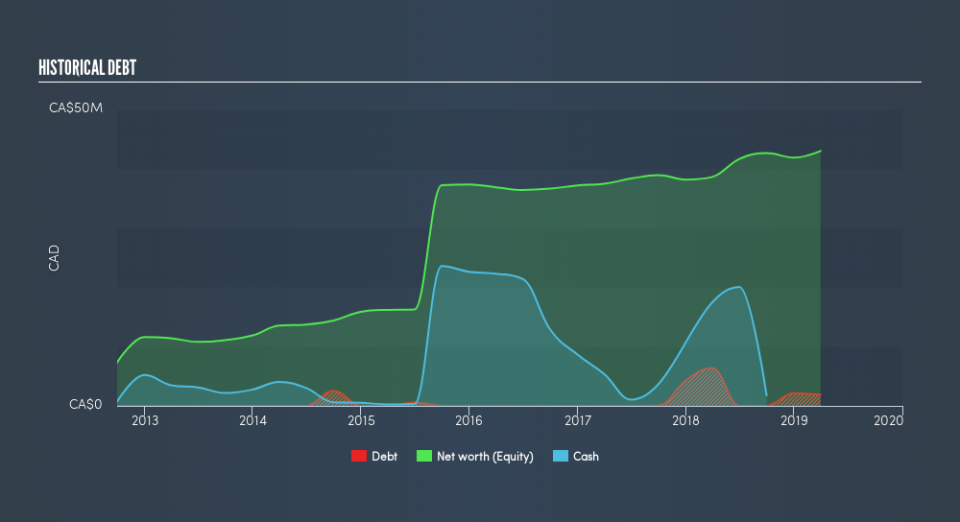Is Altura Energy (CVE:ATU) Using Too Much Debt?

Warren Buffett famously said, 'Volatility is far from synonymous with risk.' It's only natural to consider a company's balance sheet when you examine how risky it is, since debt is often involved when a business collapses. We can see that Altura Energy Inc. (CVE:ATU) does use debt in its business. But the real question is whether this debt is making the company risky.
When Is Debt A Problem?
Debt is a tool to help businesses grow, but if a business is incapable of paying off its lenders, then it exists at their mercy. If things get really bad, the lenders can take control of the business. However, a more frequent (but still costly) occurrence is where a company must issue shares at bargain-basement prices, permanently diluting shareholders, just to shore up its balance sheet. Having said that, the most common situation is where a company manages its debt reasonably well - and to its own advantage. The first step when considering a company's debt levels is to consider its cash and debt together.
See our latest analysis for Altura Energy
What Is Altura Energy's Net Debt?
As you can see below, Altura Energy had CA$1.89m of debt at March 2019, down from CA$6.38m a year prior. However, because it has a cash reserve of CA$1.77m, its net debt is less, at about CA$121.0k.
How Strong Is Altura Energy's Balance Sheet?
Zooming in on the latest balance sheet data, we can see that Altura Energy had liabilities of CA$5.32m due within 12 months and liabilities of CA$7.40m due beyond that. Offsetting these obligations, it had cash of CA$1.77m as well as receivables valued at CA$2.97m due within 12 months. So its liabilities outweigh the sum of its cash and (near-term) receivables by CA$7.98m.
Since publicly traded Altura Energy shares are worth a total of CA$40.3m, it seems unlikely that this level of liabilities would be a major threat. Having said that, it's clear that we should continue to monitor its balance sheet, lest it change for the worse. Carrying virtually no net debt, Altura Energy has a very light debt load indeed.
In order to size up a company's debt relative to its earnings, we calculate its net debt divided by its earnings before interest, tax, depreciation, and amortization (EBITDA) and its earnings before interest and tax (EBIT) divided by its interest expense (its interest cover). The advantage of this approach is that we take into account both the absolute quantum of debt (with net debt to EBITDA) and the actual interest expenses associated with that debt (with its interest cover ratio).
Altura Energy has very little debt (net of cash), and boasts a debt to EBITDA ratio of 0.013 and EBIT of 15.6 times the interest expense. Indeed relative to its earnings its debt load seems light as a feather. Even more impressive was the fact that Altura Energy grew its EBIT by 3549% over twelve months. That boost will make it even easier to pay down debt going forward. There's no doubt that we learn most about debt from the balance sheet. But ultimately the future profitability of the business will decide if Altura Energy can strengthen its balance sheet over time. So if you want to see what the professionals think, you might find this free report on analyst profit forecasts to be interesting.
Finally, a business needs free cash flow to pay off debt; accounting profits just don't cut it. So we clearly need to look at whether that EBIT is leading to corresponding free cash flow. During the last two years, Altura Energy burned a lot of cash. While investors are no doubt expecting a reversal of that situation in due course, it clearly does mean its use of debt is more risky.
Our View
Based on what we've seen Altura Energy is not finding it easy conversion of EBIT to free cash flow, but the other factors we considered give us cause to be optimistic. In particular, we are dazzled with its interest cover. Considering this range of data points, we think Altura Energy is in a good position to manage its debt levels. But a word of caution: we think debt levels are high enough to justify ongoing monitoring. Of course, we wouldn't say no to the extra confidence that we'd gain if we knew that Altura Energy insiders have been buying shares: if you're on the same wavelength, you can find out if insiders are buying by clicking this link.
If you're interested in investing in businesses that can grow profits without the burden of debt, then check out this free list of growing businesses that have net cash on the balance sheet.
We aim to bring you long-term focused research analysis driven by fundamental data. Note that our analysis may not factor in the latest price-sensitive company announcements or qualitative material.
If you spot an error that warrants correction, please contact the editor at editorial-team@simplywallst.com. This article by Simply Wall St is general in nature. It does not constitute a recommendation to buy or sell any stock, and does not take account of your objectives, or your financial situation. Simply Wall St has no position in the stocks mentioned. Thank you for reading.

 Yahoo Finance
Yahoo Finance 
